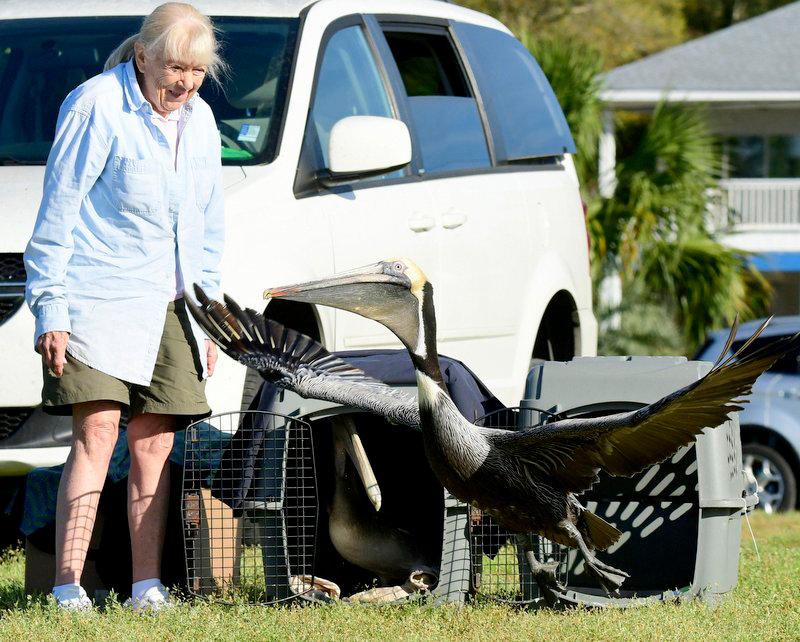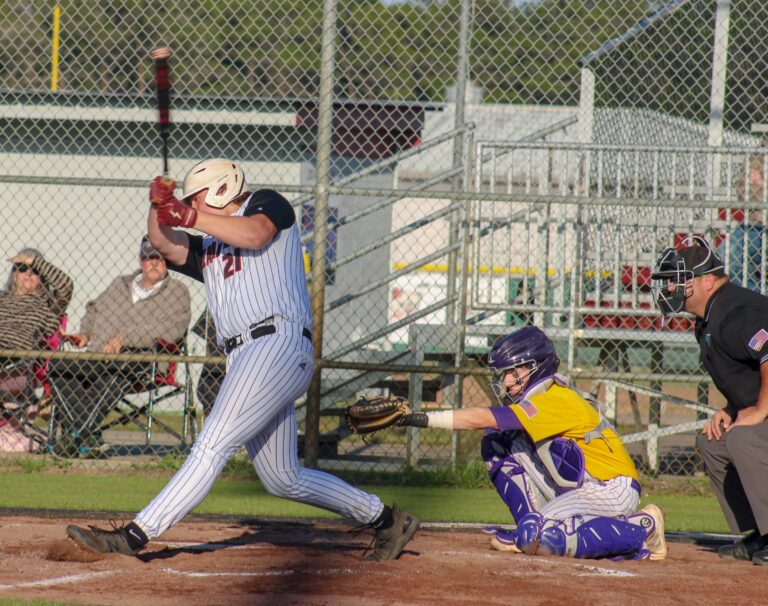Carrabelle birdman frees the freezing
Winter is usually a time of hardship for birds that live here or migrate through, as food is less plentiful.
The bait fish have gone offshore and they have to learn a new way of hunting.
When the temperatures dip below freezing, the threat is even greater to the poorly nourished avians, as they have to burn a lot more of their precious energy just to stay warm.
That’s where Carrabelle’s Jon Johnson steps in, crisscrossing both Franklin and Gulf counties, with a net and know-how, as an expert wildlife rescuer.
On New Year’s Day, it was an immature red-tailed hawk that he caught on Mill Road in Carrabelle, after the homeowner called FWC about what he thought was an eagle sitting on a balcony in his backyard.
“The FWC didn’t think he was capable of catching it,” Johnson said. “From experience I knew how to confront it, and gently put the net on it.”
Even with great weather, more than three-quarters of immature birds up north don’t make it through their first year, as they fail to avoid being eaten or not eating enough.
“He was real alert, not as bad as some immature birds,” Johnson said. “He’s starving and he’s weak and he just used up a bunch of energy during that cold spell.”
Johnson knows what he’s doing, after retiring after almost 30 years from St. Francis Wildlife Association in Tallahassee, the only big such facility between Pensacola and Jakcsonville, treating some 3,500 animals a year.
“I took him home, where I had some frozen rats so I thawed one and put it in there and see if he’d eat it. He didn’t. The next day he was looking alert so I wove the rat in the air kennel,” Johnson said.
“He kind of looked at it, and as soon as I touched the back of the rat and wiggled it, he grabbed it by his foot and yanked it in the cage,” he said. “He ate the whole rat, tore it apart piece by piece. They eat everything whole.
“You can tell they’ve had a big meal, their crop bulges out,” he said. “They digest in their crop, and then overnight, after the crop gets every last bit of nutrition, they throw up a pellet.
“Because of my training, when I get an animal that’s not stable, I can give them subcutaneous fluids and wrap their wings and do things to stabilize them at first. A lot won’t live long enough to make the trip if they’re right they’re at the edge.”
A lot, though, will survive, thanks to volunteers who call in tips. Such as Indian Pass’ Janna Rinehart, a turtle nest watch volunteer who is the main organizer in Gulf County of bird rescues.
Rinehart took a recent rescue all the way to Wakulla County near Medart, to the Florida Wild Mammal Association, where Jessica Beatty has taken over for her mom, founder Chris Beatty, who passed away last year.
“She’ll keep him (the hawk) probably another month or so to give him the best chance of not starving,” Johnson said. “She’ll probably feed him more thawed-out rats. Then she’ll call me and I’ll release him.”
Johnson releases the birds, often pelicans, in places where they have the best chance of thriving, such as the shore near the Lanark Village Boat Club. “They’ll fly off 25 to 30 yards and they’re out there together, and there’s that shoal they’ll fly over to, and it’s the best place they can be,” he said.
The shoal, about 300 to 400 yards offshore, is a nesting ground for pelicans. “During the hurricanes that’s where I get the babies washed off it,” he said. “Some pelicans mate for life, so I’m hoping its mate will still be around. We want to give them the best chance we can.”
Johnson is grateful for the support of Franklin County Extension Agent Erik Lovestarnd, and local and area law enforcement, such as Franklin County Sheriff A.J. Smith, who bought nets for his deputies. “The main thing is they call me right away, and they send a deputy there when possible,” he said. “Pelicans, ospreys, when people stop and try to save them themselves they can cause a traffic accident.”
So far this season Johnson hasn’t seen the catastrophes of a few years ago, when 17 pelicans on Dog Island alone suffered from frozen feet.
“Some may get frozen paunches,” he said. “If it’s not too bad they can cut the bad tissue away and sew the patch up.”
Johnson has also seen other sorts of bird deaths, such as two eagles this winter who were poisoned from eating ducks shot with lead shot.
“The duck dies and eagles grab them and eat them and they get lead poisoning,” he said. It’s a shame to see mature birds, male and female, that have overcome everything else and got poisoned.”
People interested in reporting birds in distress, or to help support bird rescue efforts can call Johnson at 850-510-4568, or FWC’s Wildlife Alert number at (888) 404-3922, or the Florida Wild Mammal Association at 850-363-2351 or 850-363-1032. The FWMA is supported entirely by donations and is always in need of funds to keep their work going.



Meet the Editor
David Adlerstein, The Apalachicola Times’ digital editor, started with the news outlet in January 2002 as a reporter.
Prior to then, David Adlerstein began as a newspaperman with a small Boston weekly, after graduating magna cum laude from Brandeis University in Waltham, Massachusetts. He later edited the weekly Bellville Times, and as business reporter for the daily Marion Star, both not far from his hometown of Columbus, Ohio.
In 1995, he moved to South Florida, and worked as a business reporter and editor of Medical Business newspaper. In Jan. 2002, he began with the Apalachicola Times, first as reporter and later as editor, and in Oct. 2020, also began editing the Port St. Joe Star.